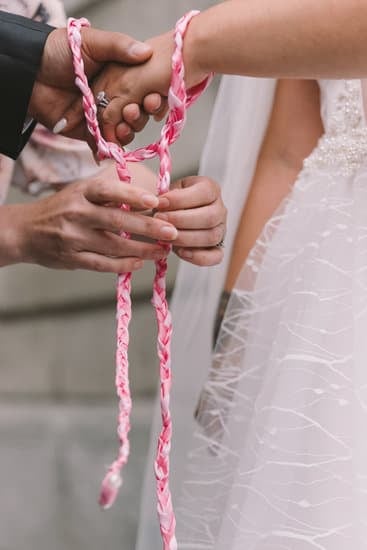Planning a wedding can be an exciting and overwhelming experience, but one aspect that should not be overlooked is the wedding rehearsal. This crucial event allows the wedding party to practice their roles and ensures that everything runs smoothly on the big day. In this article, we will explore how to conduct a wedding rehearsal, from selecting the participants to planning the timeline and incorporating a rehearsal dinner.
A well-executed wedding rehearsal can set the tone for a successful and stress-free ceremony, making it an essential part of the wedding preparation process. By having everyone run through their roles and responsibilities, you can iron out any potential issues or hiccups before they occur on the actual day. With careful planning and effective guidance, the rehearsal can help alleviate any anxiety and ensure that everyone feels confident and ready for the main event.
In this guide, we will cover everything you need to know about conducting a wedding rehearsal, including choosing the right location, establishing a schedule, incorporating a rehearsal dinner, and receiving last-minute reminders for a successful event. Whether you are a first-time bride or groom, a seasoned wedding planner, or an officiant looking for guidance on guiding the wedding party with confidence, this article will provide valuable insights into creating a memorable and flawless ceremony.
Setting the Stage
Choosing the right location for a wedding rehearsal is an essential part of ensuring that the event runs smoothly and effectively. The chosen location should be convenient and suitable for the size and style of the wedding, providing ample space for all participants to move around comfortably without feeling crowded.
When selecting a venue for the wedding rehearsal, consider factors such as proximity to the actual wedding site, availability of necessary amenities, and overall ambiance. Many couples opt to hold their rehearsal at the same location as their wedding ceremony in order to familiarize themselves with the surroundings, while others may choose a separate but similar venue to maintain an element of surprise.
It’s important to ensure that the chosen location for the rehearsal is available for booking on the desired date and time. Additionally, confirming any specific rules or regulations regarding the use of the venue is crucial in order to avoid any last-minute issues on the day of the rehearsal. Ultimately, choosing a suitable location sets a positive tone for the entire wedding weekend and alleviates unnecessary stress for all involved.
| Factors to Consider | Potential Venue Options |
|---|---|
| Proximity to Wedding Site | Same Location vs Separate Venue |
| Amenities Availability | Indoor vs Outdoor Space |
| Rules and Regulations | Venue Booking Confirmation |
Selecting the Participants
When it comes to conducting a wedding rehearsal, one of the key considerations is deciding who should be involved in the event. The rehearsal is an essential part of the wedding preparation process, as it provides an opportunity for all participants to familiarize themselves with their roles and ensure that everything runs smoothly on the big day.
First and foremost, the bride and groom should be present at the rehearsal, along with their immediate family members. This includes parents, siblings, and any other close relatives who will have specific roles during the ceremony. Additionally, it is important to involve the bridal party, such as bridesmaids, groomsmen, flower girls, ring bearers, and ushers. These individuals play crucial roles in the wedding ceremony and should be fully briefed on what is expected of them.
It is also common for other key individuals to be included in the rehearsal, such as the officiant or celebrant who will be leading the ceremony. In some cases, musicians or singers may also attend in order to rehearse any music or readings that will take place during the ceremony. By involving all necessary parties in the rehearsal process, you can ensure that everyone is on the same page and ready for the main event.
| Participants | Description |
|---|---|
| Bride & Groom | The main focus of the wedding; they need to understand where they should stand and what actions are expected of them during different parts of the ceremony. |
| Immediate Family Members | Parents, siblings, and close relatives need to know their roles during various parts of the ceremony. |
| Bridal Party | Bridesmaids/groomsmen/flower girls/ring bearers/ushers; each member has a specific role during different parts of the ceremony. |
Planning the Timeline
When it comes to planning a wedding rehearsal, establishing a clear and organized schedule is essential to ensure that everything runs smoothly. Here are some tips on how to create a timeline for your rehearsal:
1. Start with the basics: Begin by setting a date and time for the rehearsal that works for all involved, including the wedding party, family members, and any vendors or wedding coordinators who may need to be present.
2. Consider the logistics: Take into account the location of the ceremony venue and the availability of any other spaces needed for the rehearsal. If possible, try to schedule the rehearsal for a time when there won’t be other events or activities taking place at the venue.
3. Map out the order of events: Create an outline of how you want the rehearsal to flow, including each part of the ceremony and any specific instructions or cues that need to be followed. Be sure to allocate enough time for each segment so that everyone has ample opportunity to practice their roles.
4. Factor in time for questions and adjustments: Allow some flexibility in your schedule to address any last-minute concerns or changes that may arise during the rehearsal. This will help ensure that everyone feels confident and prepared for the actual wedding day.
By following these guidelines, you can establish a well-organized timeline for your wedding rehearsal that sets the stage for a successful and enjoyable event.
Remember: A well-structured timeline not only helps things run smoothly but also ensures that everybody involved understands their role in making this emotional day extraordinary.
Rehearsal Dinner
A wedding rehearsal is not just an opportunity to practice the ceremony, but it also serves as a time for the couple and their loved ones to come together and celebrate the upcoming nuptials. One way to incorporate this celebration into the rehearsal is by organizing a rehearsal dinner. This pre-wedding event allows the wedding party, family members, and close friends to mingle and enjoy a meal together before the big day.
Choosing a Venue
When planning the rehearsal dinner, it’s important to choose a location that is convenient for everyone involved in the wedding. Whether it’s a private room at a restaurant, a backyard BBQ, or a formal banquet hall, the venue should reflect the couple’s style and budget. Consider factors such as accessibility, parking, and capacity as you make your selection.
Celebratory Atmosphere
The rehearsal dinner provides an opportunity for guests to relax and unwind before the main event. Incorporate personal touches into the dinner to make it feel special for everyone involved. This could include sentimental speeches, fun games or activities, or personalized decorations that tie into the wedding theme.
Adding Structure
While the focus of the evening should be on celebrating, it’s also important to stick to a loose schedule so that everyone can get enough rest ahead of the big day. Consider whether you want formal seating arrangements or if you’d prefer a more casual approach where guests can mix and mingle freely.
Either way, ensure that there is enough time within the evening for any last-minute preparations or final run-throughs for those involved in the ceremony.
Incorporating a rehearsal dinner into your wedding rehearsal can add an extra layer of joy and anticipation as you prepare for your special day. With thoughtful planning and attention to detail, this celebratory event can set just the right tone for what promises to be an unforgettable celebration of love and commitment.
The Role of the Officiant
As the officiant, it is your responsibility to lead and guide the wedding rehearsal with confidence. Your role in the wedding goes beyond just performing the ceremony; you are also instrumental in ensuring that everything runs smoothly during the rehearsal. Here are some key tips on how to conduct a wedding rehearsal effectively.
First and foremost, it’s crucial to communicate with the couple and their wedding planner or coordinator ahead of time to understand their vision for the ceremony. This includes knowing where everyone will stand, how they plan to enter and exit, and any special rituals or traditions that will be included. Having a clear understanding of these details will help you guide the participants during the rehearsal process.
During the rehearsal, take charge of directing the flow of the ceremony. This involves instructing participants on where to stand, when to move, and how to perform certain actions such as exchanging vows or rings. It’s important to do so in a clear and confident manner so that everyone understands their role and feels at ease.
Lastly, use this time to address any concerns or questions from the couple or their wedding party. Reassure them that you are there to guide them through the process and offer any necessary advice or reassurance. By being proactive in addressing potential issues during the rehearsal, you can help alleviate any anxiety or uncertainty about the upcoming ceremony. Remember, your confidence and expertise as an officiant will set a positive tone for the entire wedding experience.
Practice Makes Perfect
When it comes to conducting a wedding rehearsal, the ultimate goal is to ensure that the actual ceremony runs as smoothly as possible. To achieve this, here are some tips to help the participants navigate through the rehearsal process:
1. Communicate clearly: Before the rehearsal, make sure that everyone involved understands their roles and responsibilities. This includes the wedding party, family members, and any other individuals who will play a part in the ceremony. Provide them with a detailed schedule and explain what is expected of them during the rehearsal.
2. Run through the order of events: Start by going through the entire ceremony from beginning to end. This includes walking down the aisle, standing in specific positions, exchanging vows and rings, and any special rituals or readings. It’s important to practice these components multiple times until everyone feels comfortable with their parts.
3. Troubleshoot potential issues: Use the rehearsal as an opportunity to address any potential hiccups or challenges that may arise during the actual ceremony. For example, if there are children involved, ensure that they understand their role and are comfortable with what they need to do. If there will be music playing, coordinate with the musicians or DJ to ensure that cues are clear and timings are on point.
4. Provide constructive feedback: As you go through each step of the ceremony, offer guidance and feedback to help everyone improve their performance. This could include tips on posture, timing, or even just providing words of encouragement to boost confidence.
By following these tips for conducting a wedding rehearsal, you can help ensure that everyone involved is well-prepared for the big day. With clear communication, thorough practice, and a focus on problem-solving, you can help create a seamless and memorable wedding ceremony for all involved.
Final Details
Check the Venue
Before the wedding rehearsal begins, it’s essential to double-check the venue. Ensure that everything is set up as planned for the actual ceremony. This includes confirming that any decorations, chairs, or equipment are in place and functioning properly. It’s also a good idea to confirm the availability of restrooms, lighting, and any other amenities that may be needed during the ceremony.
Review Responsibilities
As you near the end of the rehearsal process, it’s important to review everyone’s roles and responsibilities. This includes not only those who will be participating in the ceremony but also any vendors or support staff who will be present on the wedding day. Make sure that everyone understands their tasks and knows what is expected of them. This can help ensure that everything runs smoothly on the big day.
Prepare for Emergencies
Finally, as you wrap up your wedding rehearsal planning, don’t forget to prepare for potential emergencies. Consider creating an emergency kit with items like safety pins, band-aids, stain remover wipes, and anything else that might come in handy if something goes wrong.
It’s also a good idea to designate someone to be in charge of handling any unexpected issues that may arise during the rehearsal or on the wedding day itself. Being prepared for emergencies can provide peace of mind and help ensure a successful event.
By attending to these final details and following these tips, you can help ensure that your wedding rehearsal is a success. Remember, a well-executed rehearsal can set the stage for a beautiful and memorable wedding ceremony.
Conclusion
In conclusion, a well-executed wedding rehearsal is an invaluable part of the wedding planning process. It provides an opportunity for everyone involved in the ceremony to understand their roles and responsibilities, ensuring that the actual wedding day runs smoothly. By dedicating time to practice and prepare, couples can alleviate any last-minute stress and feel confident that their special day will be flawless.
Understanding the importance of choosing the right location, selecting the appropriate participants, and establishing a clear timeline for the rehearsal is crucial for its success. The inclusion of a rehearsal dinner can also provide a relaxed atmosphere for everyone involved to connect and feel more at ease with one another. Additionally, having a confident officiant who can guide the rehearsal with authority is essential in ensuring that all details are thoroughly covered.
Ultimately, it cannot be stressed enough how valuable a well-planned and well-executed wedding rehearsal is in guaranteeing a seamless wedding day. Following these steps on how to conduct a wedding rehearsal will not only help alleviate any anxiety leading up to the big day but also create treasured memories for everyone involved in making your dream wedding a reality.
Frequently Asked Questions
What Is the Correct Order of the Wedding Rehearsal Process?
The correct order of the wedding rehearsal process typically involves gathering at the ceremony site, walking through the processional and recessional, practicing the vows and ring exchange, and going over any specific logistics or instructions for the wedding day.
What Do You Do During a Wedding Rehearsal?
During a wedding rehearsal, participants usually walk through their roles in the ceremony, such as entering and exiting the venue, standing in their designated positions, and practicing any readings or musical performances. It’s also an opportunity to iron out any last-minute details or concerns.
What Do You Say at a Wedding Rehearsal?
At a wedding rehearsal, it’s common to express gratitude for everyone’s time and participation, offer words of encouragement to nervous members of the wedding party, and perhaps share a brief sentiment about the significance of the upcoming marriage. It’s also a chance to clarify any remaining questions or issues before the big day.

I have been involved in marriages for over 20 years helping couples and singles understand more about them.





